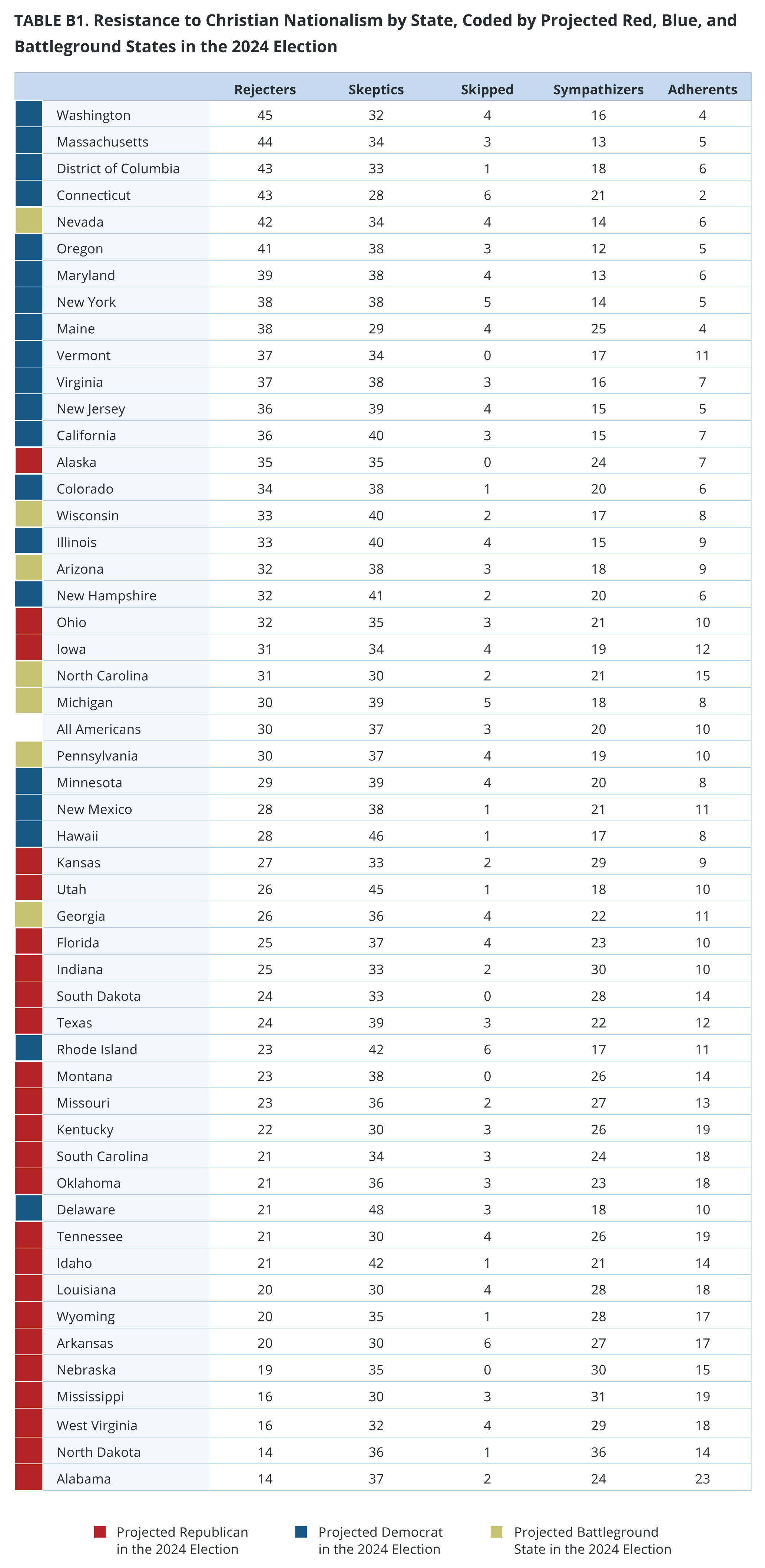To view a PDF of findings presented October 30, 2024, click here. To view the release event featuring a panel discussion of the survey’s findings, click here.
Introduction
In recent years, Christian nationalism has emerged as a major issue and source of division in American politics. While much attention has rightfully been paid to the strength of Christian nationalist beliefs and their implications among the general public, less attention has been paid to the large swaths of Americans who resist Christian nationalist beliefs. Insofar as Christian nationalism frames Christianity as an essential feature of American culture and identity, and in some cases calls for the exclusion of non-Christian citizens from positions of power and influence, it makes sense that non-Christian groups would be the most resistant to Christian nationalism. But resistance to Christian nationalism is found across most religious traditions, as well as across political parties, demographic groups, and geographic regions.
Throughout 2023, PRRI interviewed more than 22,000 adults as part of its American Values Atlas, which provides for the first time the ability to estimate support for Christian nationalism in all 50 states. In February 2024, PRRI released a comprehensive report on Support for Christian Nationalism in All 50 States. This PRRI-Meanings of Democracy Lab report will assess the state of Americans’ resistance to the ideas associated with Christian nationalism in all 50 states.
Executive Summary
Roughly seven in ten Americans qualify as Christian nationalism Rejecters or Skeptics.
- Seven in ten Americans qualify as Christian nationalism Skeptics (37%) or Rejecters (30%), compared with three in ten who qualify as Christian nationalism Adherents (10%) or Sympathizers (20%).
- These percentages have remained stable since PRRI first asked these questions in late 2022.
Residents of blue states are significantly more likely than those in red states to resist Christian nationalist beliefs.
- Seventy-five percent of Americans qualify as Christian nationalism Skeptics (38%) or Rejecters (37%) in blue states, compared with six in ten Christian nationalism Skeptics (36%) and Rejecters (24%) in red states.
- Most Americans in battleground states are Christian nationalism Skeptics (36%) or Rejecters (31%).
At the national level, resistance to Christian nationalism is strongly linked to Democratic Party affiliation and holding negative views of former President Donald Trump.
- Over eight in ten Democrats qualify as Christian nationalism Skeptics (34%) or Rejecters (49%), compared with over four in ten Republicans who qualify as Skeptics (35%) or Rejecters (8%).
- Among Christian nationalism Skeptics or Rejecters, 77% hold very or somewhat unfavorable views of Trump.
- Among Democrats who qualify as Christian nationalism Skeptics or Rejecters, nearly all hold unfavorable views of Trump (95%).
- Among Republicans who qualify as Christian nationalism Skeptics or Rejecters, 38% hold unfavorable views of Trump, compared with 27% among all Republicans.
- Christian nationalism resisters who classify themselves as independent are far more negative in their assessments of Trump than of Biden: just one in five (20%) view Trump favorably, compared with 45% who view Biden favorably. Moreover, 78% of these independent Christian nationalism resisters hold unfavorable views of Trump.
Resistance to Christian nationalism is strongly linked to being a religious minority or religiously unaffiliated, but many Christians are also skeptical.
- Religiously unaffiliated and Jewish Americans are the groups most resistant to Christian nationalism, with 63% of each qualifying as Christian nationalism Rejecters, and another one-third of each qualifying as Skeptics (28% and 29%, respectively).
- The majority of Americans who are religious minorities, such as Muslims, Buddhists, Hindus, Unitarian Universalists, and other non-Christian religions, are also Christian nationalism Rejecters (48%) and Skeptics (38%).
- There is also a cluster of Christian groups whose primary orientation toward Christian nationalism is skepticism. Of these, Latter-day Saints (49%) are most skeptical followed by Hispanic Catholics (48%), other Catholics of color (47%), white mainline/non-evangelical Protestants (47%), white Catholics (45%), and Black Protestants (43%).
- Though white evangelical Protestants are the strongest supporters of Christian nationalism, they nonetheless make up a small slice of Christian nationalism resisters, including 10% of Christian nationalism Skeptics and 2% of Rejecters.
White Christians’ concentration among Christian nationalism resisters varies depending on whether they live in red, blue, or battleground states.
- White Christians make up a larger share of Christian nationalism Rejecters in battleground states (24%) than in red (19%) or blue states (18%).
- White Christians make up a larger share of Christian nationalism Skeptics in red (47%) and battleground states (47%) than in blue states (41%).
While rates of Bible readership, prayer, and church attendance are highest among Christian nationalism Adherents and Sympathizers, Christian nationalism resisters are not unreligious — particularly Christian nationalism Skeptics.
- While 31% of Americans who read the Bible weekly qualify as Christian nationalism Sympathizers and 24% as Christian nationalism Adherents, one-third of weekly Bible readers are Christian nationalism Skeptics (33%).
- While more than one in four (28%) Americans who pray weekly are Christian nationalism Sympathizers and 17% are Christian nationalism Adherents, 37% of Americans who pray weekly are Christian nationalism Skeptics.
- While more than half of Americans who attend church weekly are either Christian nationalism Sympathizers (31%) or Adherents (21%), over one-third of weekly church attenders are Christian nationalism Skeptics (36%).
- Christian nationalism Rejecters are significantly less likely to engage in most of these religious practices than other groups, but they also are not entirely non-practicing. Seven percent of Americans who read the Bible at least once a week and 16% of those who do so at least a few times a year reject Christian nationalism beliefs. Similarly, 8% of those who attend religious services at least once a week and 19% of those who do so at least a few times a year are Christian nationalism Rejecters.
Christian nationalism resisters are less likely than other Americans to see political struggles through the apocalyptic lens of revolution and to support political violence.
- A small minority of Christian nationalism Skeptics (22%) and Rejecters (7%) agree that “there is a storm coming soon that will sweep away the elites in power and restore the rightful leaders,” compared with 54% of Christian nationalism Adherents and 45% of Sympathizers.
- Only 17% of Christian nationalism Skeptics and 7% of Rejecters agree that “because things have gotten so far off track, true American patriots may have to resort to violence to save the country.” In comparison, Christian nationalism supporters are about twice as likely as other Americans to believe political violence may be justified, including nearly four in ten Christian nationalism Adherents (38%) and one-third of Sympathizers (33%).
Measuring Christian Nationalism
To measure resistance to Christian nationalism, PRRI used a battery of five questions about the relationship between Christianity, American identity, and the U.S. government. The questions were first developed for the PRRI/Brookings Christian nationalism survey, which was based on data collected in late 2022 and released in a major report in February 2023 (See Appendix A for full methodology). PRRI included these five questions in four follow-up surveys throughout 2023, which were each conducted among a representative sample of more than 5,000 Americans. Respondents were asked whether they completely agree, mostly agree, mostly disagree, or completely disagree with each of the following statements:
- The U.S. government should declare America a Christian nation.
- U.S. laws should be based on Christian values.
- If the U.S. moves away from our Christian foundations, we will not have a country anymore.
- Being Christian is an important part of being truly American.
- God has called Christians to exercise dominion over all areas of American society.
Based on their answers to these five questions, each respondent received a composite score on the Christian nationalism scale (with a range of 0 to 1) and was then assigned to one of four groups:
Christian Nationalism Rejecters (Score 0): These Americans completely disagree with all five statements in the scale. This group includes 30% of Americans.
Christian Nationalism Skeptics (Score 0.01-0.49): These Americans disagree with most statements in the scale, but, unlike Rejecters, do not completely disagree with all statements. This group includes 37% of Americans.
Christian Nationalism Sympathizers (Score 0.5–0.74): These Americans agree with most statements in the scale, but they are less likely than Adherents to completely agree. This group includes 20% of Americans.
Christian Nationalism Adherents (Score 0.75–1): These Americans overwhelmingly either agree or completely agree with all five statements in the scale. This group includes 10% of Americans.
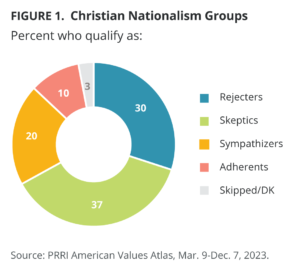
Resistance to Christian Nationalism at the State Level
Patterns of Resistance to Christian Nationalism Across All 50 States
The proportion of Americans who resist Christian nationalism, defined in this report as Christian nationalism Rejecters and Skeptics, differs considerably across states, ranging from a low of 46% to a high of 79% (see Appendix B for a table showing Christian nationalism groups in all 50 states).
While resistance to Christian nationalism is strongest in blue states, several swing states also contain larger shares of residents who resist Christian nationalism than the country as a whole. Of these, Nevada has the largest share of Christian nationalism resisters (76%) followed by Wisconsin (73%), Arizona (70%), and Michigan (69%). Surprisingly, two red states — Utah (71%) and Alaska (70%) — also have higher proportions of Christian nationalism resisters than the country as a whole.
When we look exclusively at Christian nationalism Skeptics (see Appendix B), some interesting outliers also emerge. The red states Utah (45%) and Idaho (42%) include some of the highest rates of Christian nationalism Skeptics in the country, and both Texas (39%) and Montana (38%) are home to a greater share of Christian nationalism Skeptics than the country as a whole (37%). The swing states Wisconsin (40%), Michigan (39%), and Arizona (38%) are also home to larger than average shares of Christian nationalism Skeptics.
Patterns of Resistance to Christian Nationalism by Religious Affiliation in Red, Blue, and Battleground States
In red, blue, and battleground states, unaffiliated Americans consistently make up the majority of Christian nationalism Rejecters (57%, 55%, 55%, respectively). Non-Christians also make up a consistent share of Christian nationalism Rejecters regardless of whether they live in red, blue, or battleground states (9%, 13%, 10%, respectively).
Christians of color make up a slightly lower share of Rejecters in battleground states (11%) than in red (14%) or blue states (15%). Conversely, white Christians make up a larger share of Christian nationalism Rejecters in battleground states (24%) than in red (19%) or blue states (18%).
In addition, white Christians make up a larger share of Christian nationalism Skeptics in red (47%) and battleground states (47%) than in blue states (41%), while Christians of color are better represented among Christian nationalism Skeptics in blue states (32%) and red states (28%) than in battleground states (24%). There are no differences among unaffiliated or non-Christian Skeptics in red (20% and 4%), blue (20% and 7%), or battleground states (22% and 7%).
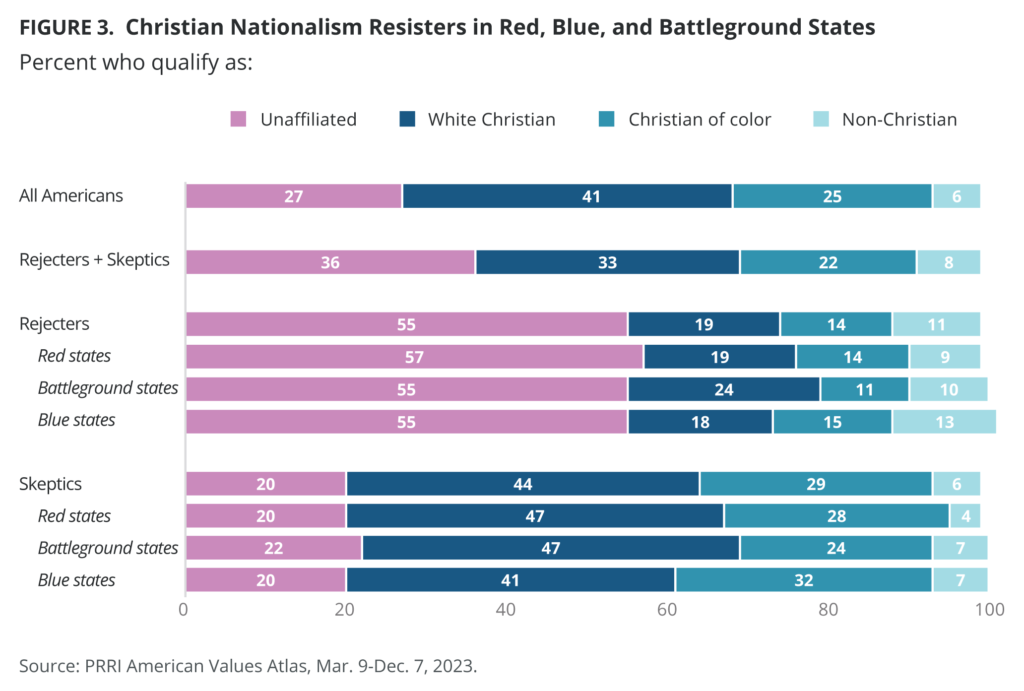 Christian Nationalism Resistance and Support for President Joe Biden by State in 2020
Christian Nationalism Resistance and Support for President Joe Biden by State in 2020
Christian nationalism resistance is also positively correlated with presidential vote choice in the 2020 election. The scatter plot below shows the relationship between a state’s average raw score on the Christian nationalism resistance scale (with a range from 0 to 1) on the X axis, plotted against the percentage of that state’s vote for President Joe Biden in the 2020 election. The upward-sloping trend line through the distribution demonstrates that, overall, the higher state residents scored on the Christian nationalism resistance scale, the more likely they were to support Biden.1
For example, Washington has an average score of 0.78 on the Christian nationalism resistance scale, and 58% of voters in that state cast their ballots for Biden in 2020. Similarly, Oregon has an average score of 0.78 on the Christian nationalism resistance scale and 57% of that state’s voters cast their ballots for Biden. At the other end of the scale, Alabama has an average Christian nationalism resistance score of 0.52 and 37% of its voters supported Biden in the 2020 election. Similarly, Mississippi has an average score of 0.52 on the Christian nationalism resistance scale, and only 41% of its voters supported Biden.2
Which Americans Are Most Likely to Resist Christian Nationalism?
Gender, Age, and Educational Attainment
There are no significant differences among Christian nationalism resisters by gender. Among both men and women, nearly seven in ten qualify as resisters of Christian nationalism (31% of men and 30% of women are Rejecters, and 38% of men and 36% of women are Skeptics).
Resistance to Christian nationalism beliefs decreases with age, with a significant break around age 50. About seven in ten Americans ages 18-29 (38% Rejecters, 33% Skeptics) and ages 30-49 (36% of both Rejecters and Skeptics) resist Christian nationalism beliefs, compared with about six in ten of those ages 50-64 (25% Rejecters, 39% Skeptics) and senior Americans ages 65+ (21% Rejecters, 38% Skeptics). The decline is even more significant when focusing on Christian nationalism Rejecters, as young Americans ages 18-29 are nearly twice as likely as senior Americans ages 65+ to report this strong form of resistance (38% vs. 21%).
Resistance to Christian nationalist beliefs is also inversely related to educational attainment. Americans with a postgraduate degree (44% Rejecters, 37% Skeptics) and with a college degree (39% Rejecters, 38% Skeptics) are significantly more likely than those with some college (28% Rejecters, 36% Skeptics) or a high school education or less (22% Rejecters, 36% Skeptics) to resist Christian nationalist beliefs.
Race and Ethnicity
There is little variation in resistance to Christian nationalist beliefs by race or ethnicity alone. Two-thirds of multiracial Americans (38% Rejecters, 31% Skeptics), Hispanic Americans (29% Rejecters, 39% Skeptics), and white Americans (31% Rejecters, 36% Skeptics) qualify as resisters of Christian nationalist beliefs. Asian Americans and Pacific Islanders (AAPI) are the most likely to resist Christian nationalist beliefs (41% Rejecters, 39% Skeptics). By contrast, the racial group whose members are the least likely to resist Christian nationalist beliefs is Black Americans, with only six in ten qualifying as Rejecters (22%) or Skeptics (38%).
PRRI’s February report conducted separate multivariate regression analyses for white, Hispanic, and Black Americans to further understand the appeal of Christian nationalism among different racial and ethnic groups. [3] The analysis revealed that among Black Americans, not having a four-year college degree, attending religious services weekly or more, and holding charismatic/prosperity gospel theological beliefs are independently linked to Christian nationalist views, in contrast to both white and Hispanic Americans, whose party affiliation also mattered. Among Black Americans, identifying as Republican and identifying as a born-again or evangelical Christian are not significant predictors of Christian nationalist views, showing that Black Americans who qualify as Christian nationalism Adherents or Sympathizers retain connections to the Democratic Party and have more favorable views of Biden than either Hispanic or white Christian nationalists. These findings suggest that Black Americans may conceptually understand Christian nationalism differently.
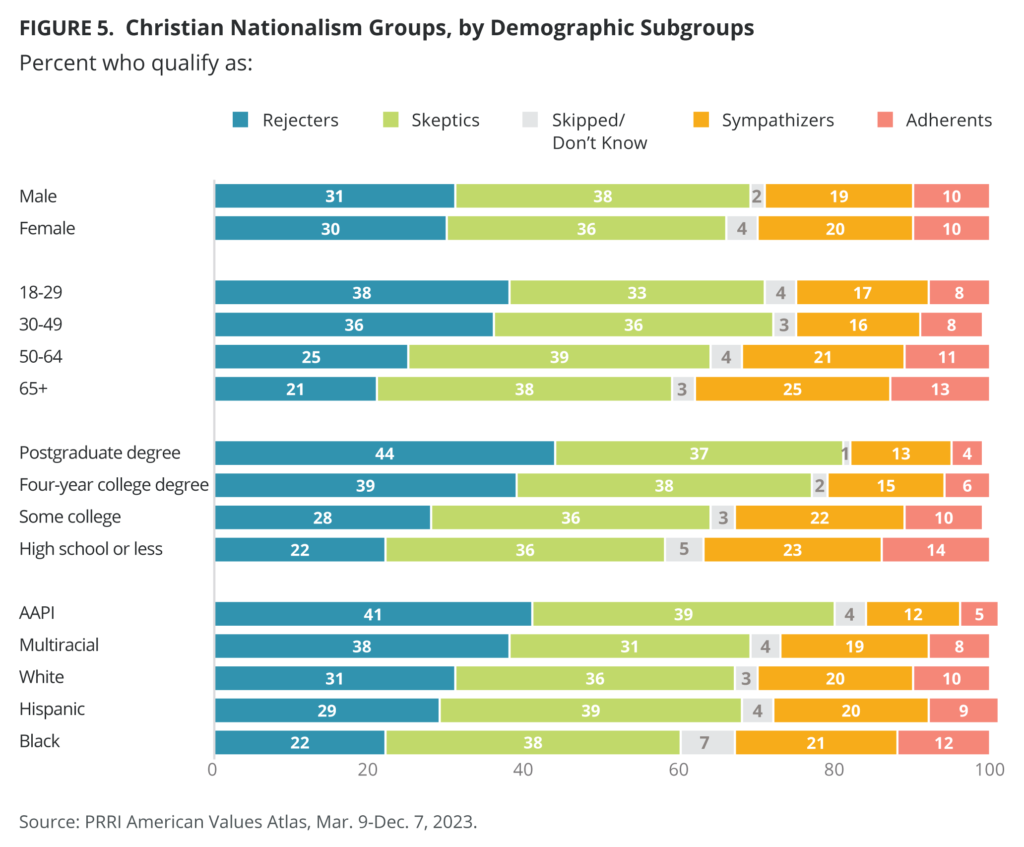
Religious Affiliation
Insofar as Christian nationalism frames Christianity as an essential feature of American culture and identity, and in some cases calls for the exclusion of non-Christian citizens from positions of power and influence, it makes sense that non-Christian groups would be the most resistant to Christian nationalism. Around two-thirds of Unitarian Universalists, the religiously unaffiliated, and Jewish Americans are Christian nationalism Rejecters, and another one-quarter of each qualify as Skeptics. The only other Americans in which Rejecters were the largest subgroup were those from other non-Christian religions, including Muslims, Buddhists, Hindus, and other non-Christian religions.
But non-Christians are not alone in their resistance to Christian nationalism. There is a second cluster of religious groups whose primary orientation toward Christian nationalism is Skepticism. Of these, Latter-day Saints (49%) are most skeptical followed by Hispanic Catholics (48%), other Catholics of color (47%), white mainline/non-evangelical Protestants (47%), white Catholics (45%), and Black Protestants (43%). However, within this cluster, Latter-day Saints and Black Protestants are distinguished from the others by their lower levels of outright rejection of (8% and 12%, respectively) and higher levels of support for Christian nationalism (42% and 39%, respectively).
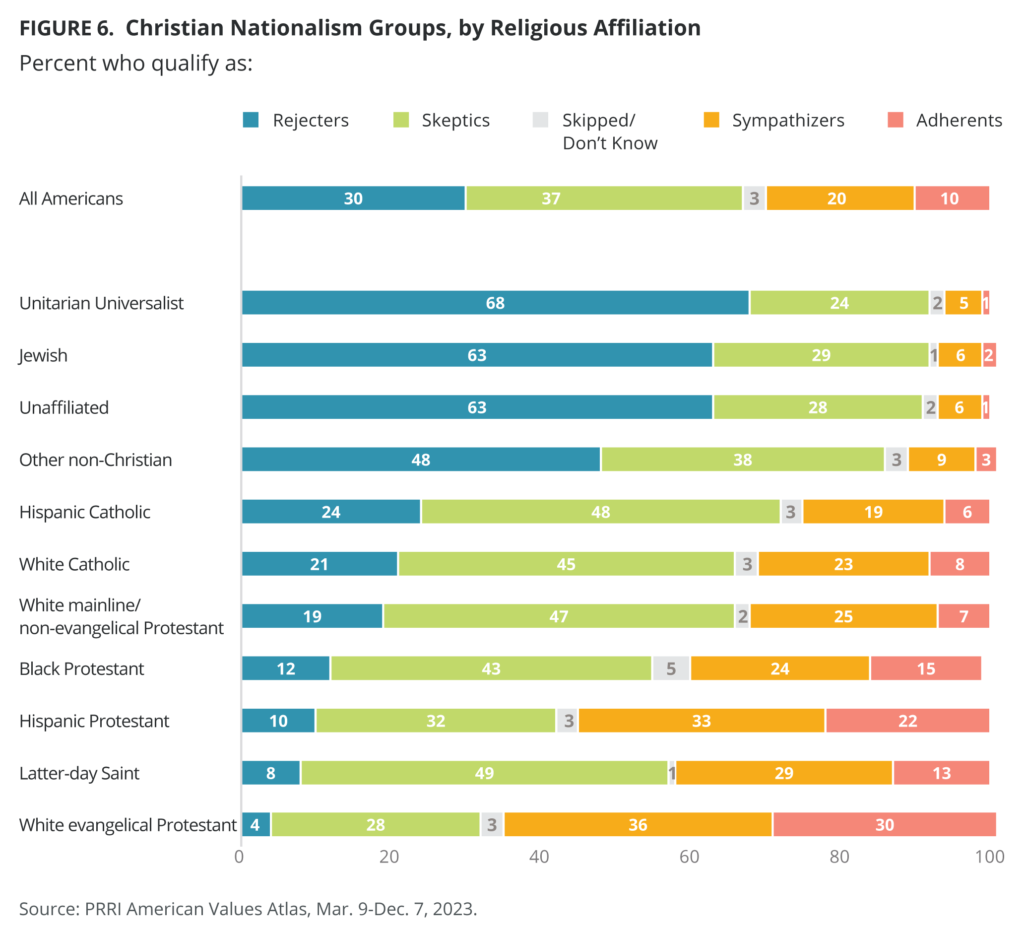
The religious composition of Christian nationalism resisters reflects similar patterns. The largest proportion of Rejecters and Skeptics are the religiously unaffiliated (55% and 20%, respectively), followed by white Catholics (9% and 15%, respectively), white mainline/non-evangelical Protestants (8% and 17%, respectively), and Hispanic Catholics (6% and 11%, respectively). Though white evangelical Protestants are the strongest supporters of Christian nationalism, they nonetheless make up a small slice of Christian nationalism resisters, including 10% of Skeptics and 2% of Rejecters. The balance of Christian nationalism resisters (Rejecters and Skeptics) is comprised of non-Christians (11% and 6%, respectively), Black Protestants (3% and 9%, respectively), and other Christians (4% and 8%, respectively).[4]
Compared with each religious group’s representation within the American religious landscape as a whole, religiously unaffiliated and non-Christian Americans are the most overrepresented within the Christian nationalism resisters. The share of Catholics and mainline/non-evangelical Protestants within the Christian nationalism resisters is relatively proportionate to their share of the population. Black Protestants and other Christians are somewhat underrepresented relative to their share of the population. White evangelical Protestants are the most underrepresented relative to their share of the U.S. population.
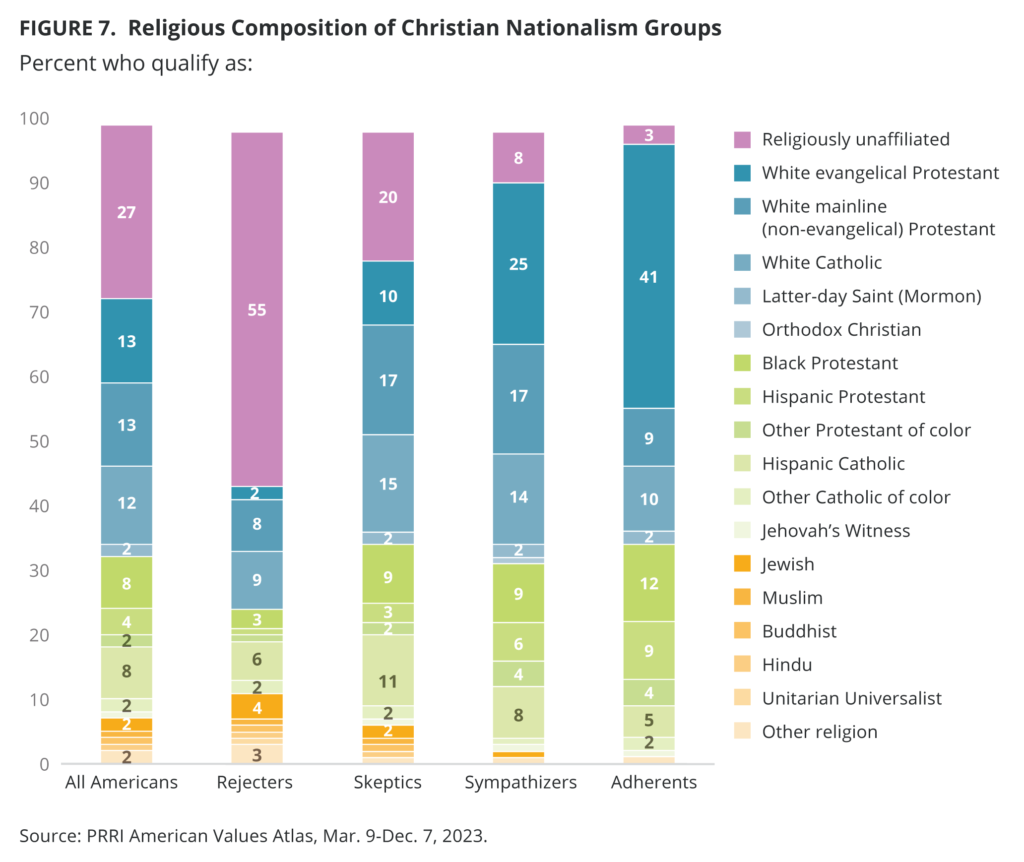
Religious Practices: Religious Attendance, Prayer, and Bible Reading
Christian nationalism Adherents and Sympathizers engage in more religious practice than Christian nationalism resisters. Christian nationalism Adherents and Sympathizers are more likely than Skeptics and Rejecters to pray regularly, read the Bible, and attend church on a weekly basis.
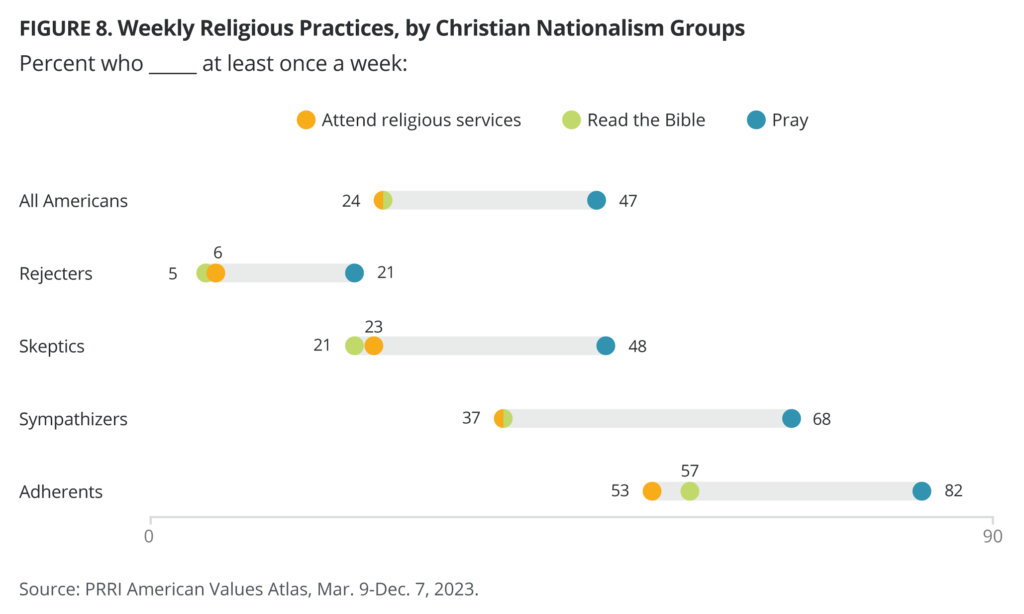 While rates of religiosity in the form of Bible reading, prayer, and church attendance are far higher among Christian nationalists, many Christian nationalism Skeptics also exhibit religious behaviors. While more than half of Americans who read the Bible weekly are Christian nationalism Adherents (24%) or Sympathizers (31%), one-third of weekly Bible readers are Christian nationalism Skeptics (33%). More than one-third of weekly church attenders (36%) are Christian nationalism Skeptics, compared with 31% who are Christian nationalism Sympathizers and 21% who are Christian nationalism Adherents. Finally, 37% of those who pray weekly are Christian nationalism Skeptics, while 28% are Christian nationalism Sympathizers and 17% are Christian nationalism Adherents.
While rates of religiosity in the form of Bible reading, prayer, and church attendance are far higher among Christian nationalists, many Christian nationalism Skeptics also exhibit religious behaviors. While more than half of Americans who read the Bible weekly are Christian nationalism Adherents (24%) or Sympathizers (31%), one-third of weekly Bible readers are Christian nationalism Skeptics (33%). More than one-third of weekly church attenders (36%) are Christian nationalism Skeptics, compared with 31% who are Christian nationalism Sympathizers and 21% who are Christian nationalism Adherents. Finally, 37% of those who pray weekly are Christian nationalism Skeptics, while 28% are Christian nationalism Sympathizers and 17% are Christian nationalism Adherents.
While Christian nationalism Rejecters are significantly less likely to engage in most of these religious practices than other groups, they also are not entirely non-practicing. Seven percent of Americans who read the Bible at least once a week and 16% of those who do so at least a few times a year reject Christian nationalist beliefs. Similarly, 8% of those who attend religious services at least once a week and 19% of those who do so at least a few times a year are Christian nationalism Rejecters.
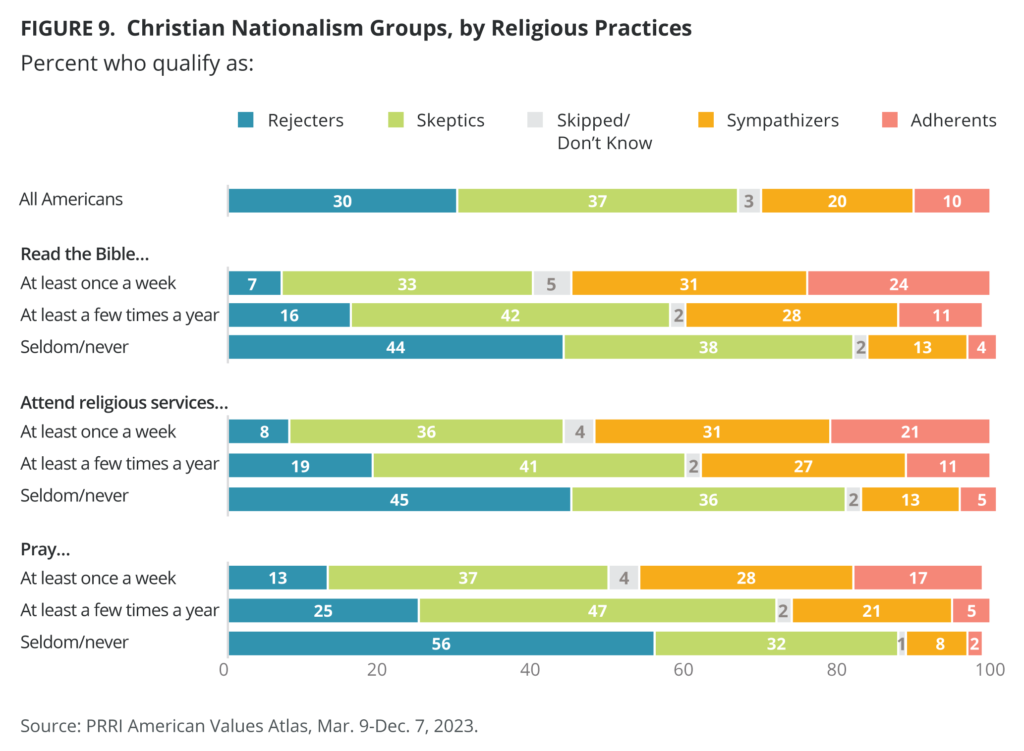
The Politics of Resistance to Christian Nationalism
Resistance to Christian nationalism strongly colors Americans’ views about Biden and former President Donald Trump. While roughly half of Christian nationalism Skeptics and Rejecters hold favorable views of Biden (52%), 77% of Christian nationalism resisters hold unfavorable views of Trump, with 66% holding very unfavorable views.
However, resistance to Christian nationalist views does not negate the influence of partisanship when it comes to viewing political leaders favorably. Six in ten Christian nationalism resisters who identify as Republican (61%) still view Trump favorably, compared with just 9% who view Biden favorably. Meanwhile, 83% of Democratic Christian nationalism resisters view Biden favorably, while only 5% view Trump favorably.
Christian nationalism resisters who classify themselves as independent are far more negative in their assessments of Trump than Biden: just one in five view Trump favorably (20%), compared with 45% who view Biden favorably. Moreover, 78% of these independent Christian nationalism resisters hold unfavorable views of Trump, with 65% holding very unfavorable views.
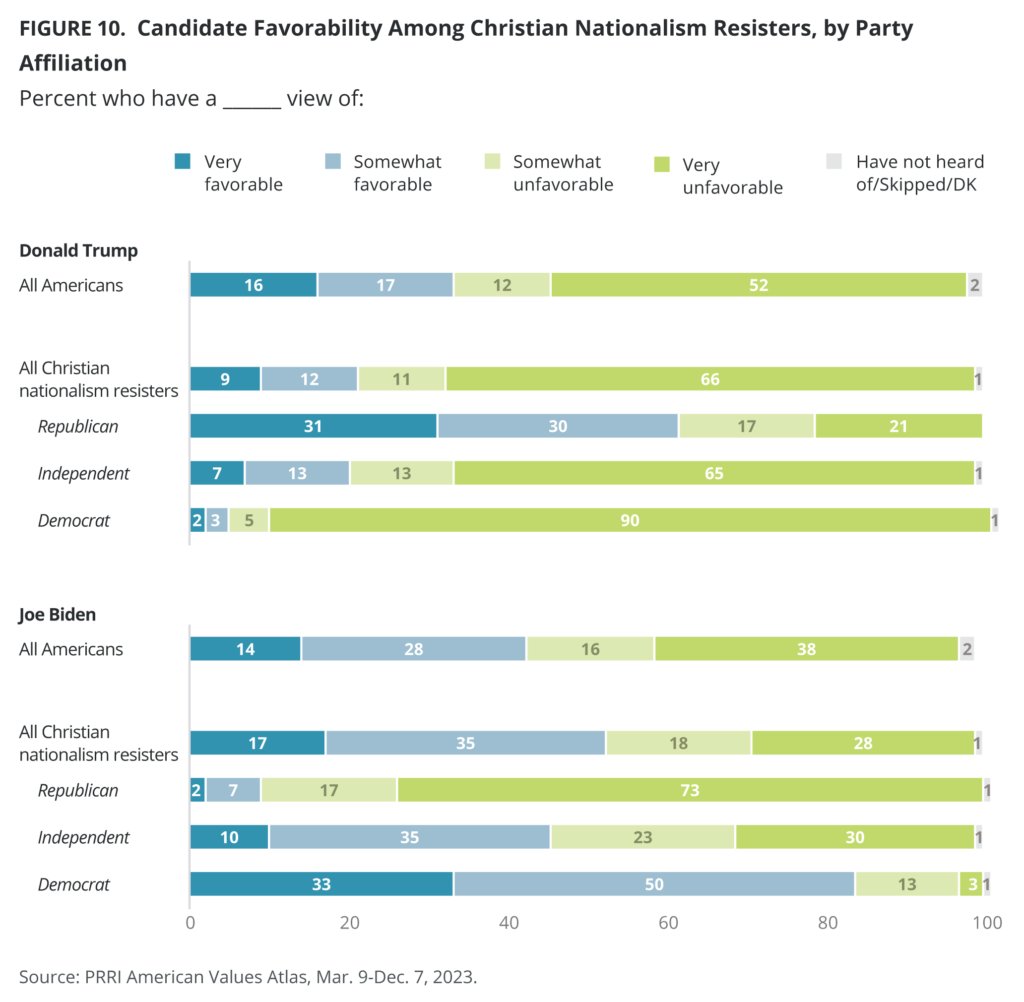
Apocalyptic Lens of Revolution and Support for Political Violence
A small minority of Christian nationalism Skeptics (22%) and Rejecters (7%) agree that “there is a storm coming soon that will sweep away the elites in power and restore the rightful leaders,” compared with 54% of Christian nationalism Adherents and 45% of Sympathizers. Among Christian nationalism Skeptics and Rejecters, a lower percentage of those who identify as Republican (17%), independents (13%), and Democrats (13%) agree with this idea.
Americans who resist Christian nationalist views also show less support for political violence. Only 17% of Christian nationalism Skeptics and 7% of Rejecters agree that “because things have gotten so far off track, true American patriots may have to resort to violence to save the country.” Among those who resist Christian nationalist views, 19% of those who identify as Republican agree, compared with 12% of those who identify as independent, and 8% of Democrats.
In comparison, Christian nationalists are about twice as likely as other Americans to believe political violence may be justified, including nearly four in ten Christian nationalism Adherents (38%) and one-third of Sympathizers (33%). Similarly, over one-third of Christian nationalists who identify as independents (37%) and Republicans (34%) support political violence, compared with 29% of Democrats.
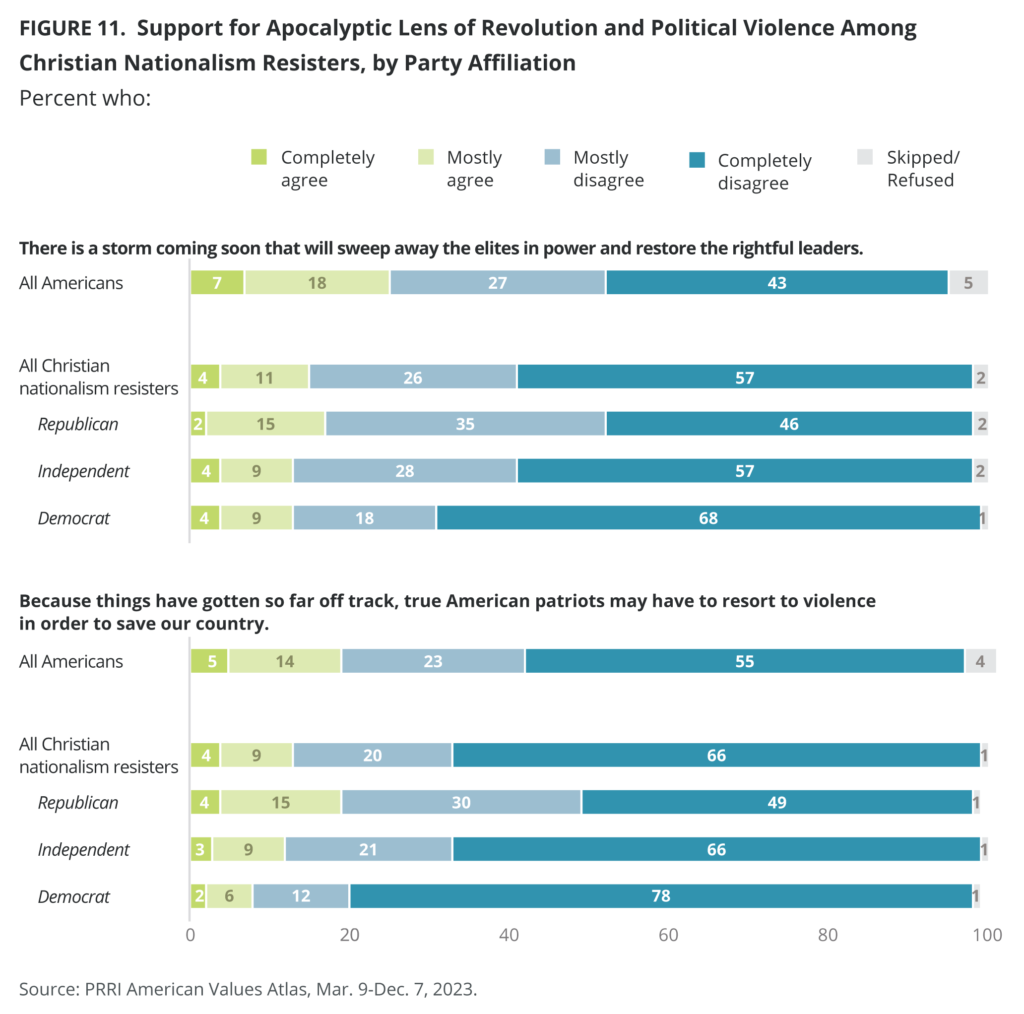
[1] The Christian nationalism resistance scale reverses the coding found in our original Christian nationalism scale, combining answers to the original five questions using an additive scale and recalibrating the scores to values from 0 (low) to 1 (high) where higher numbers depict resistance to Christian nationalism ideals while lower numbers show Christian nationalism support.
[2] 2020 voter data was retrieved from AP VoteCast Election 2020 public use data file (for details, see: apnorc.org/wp-content/uploads/2021/05/AP_VoteCast_2020_methodology.pdf).
[3] The regression models control for a range of political and socioeconomic characteristics, such as education, age, gender, partisanship, born-again/evangelical Christian identification, religious attendance, and charismatic/ prosperity gospel beliefs.
[4] Other Christians include other Protestants of color, other Catholics of color, Orthodox Christians, Jehovah’s Witnesses, and Latter day-Saints
Appendix A: Survey Methodology
The survey was designed and conducted by PRRI. The survey was made possible through the generous support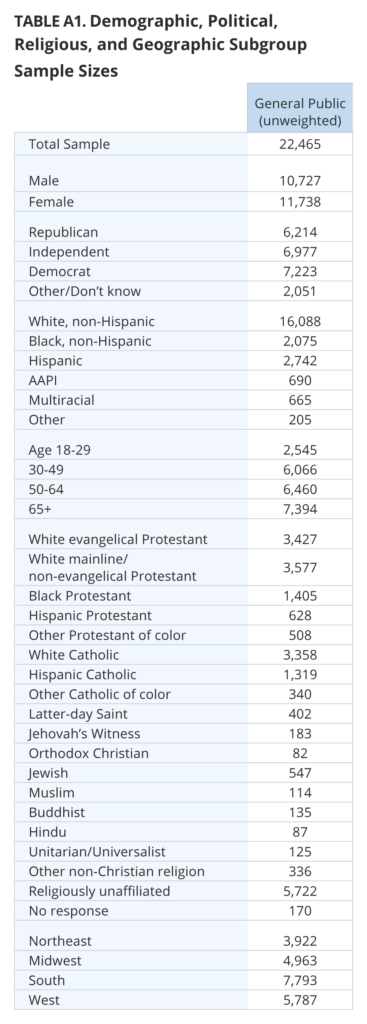 of the Carnegie Corporation of New York, the Foundation to Promote Open Society, the Wilbur & Hilda Glenn Family Foundation, and the Unitarian Universalist Veatch Program at Shelter Rock. The survey was carried out among a random representative sample of 22,465 adults (age 18 and up) living in all 50 states in the United States. Among those, 20,799 are part of Ipsos’s KnowledgePanel and an additional 1,666 were recruited by Ipsos using opt-in survey panels to increase the sample sizes in smaller states. Interviews were conducted online between March 9 and December 7, 2023.
of the Carnegie Corporation of New York, the Foundation to Promote Open Society, the Wilbur & Hilda Glenn Family Foundation, and the Unitarian Universalist Veatch Program at Shelter Rock. The survey was carried out among a random representative sample of 22,465 adults (age 18 and up) living in all 50 states in the United States. Among those, 20,799 are part of Ipsos’s KnowledgePanel and an additional 1,666 were recruited by Ipsos using opt-in survey panels to increase the sample sizes in smaller states. Interviews were conducted online between March 9 and December 7, 2023.
Respondents are recruited to the KnowledgePanel using an addressed-based sampling methodology from the Delivery Sequence File of the USPS – a database with full coverage of all delivery addresses in the U.S. As such, it covers all households regardless of their phone status, providing a representative online sample. Unlike opt-in panels, households are not permitted to “self-select” into the panel; and are generally limited to how many surveys they can take within a given time period.
The initial sample drawn from the KnowledgePanel was adjusted using pre-stratification weights so that it approximates the adult U.S. population defined by the 2022 March Supplement of the Current Population Survey (CPS), except language proficiency , which is not available from CPS, were obtained from the 2021 American Community Survey (ACS). Next, a probability proportional to size (PPS) sampling scheme was used to select a representative sample.
To reduce the effects of any non-response bias, a post-stratification adjustment was applied based on demographic distributions from the CPS. The post-stratification weight rebalanced the sample based on the following benchmarks: age, race and ethnicity, gender, Census division, metro area, education, and income. The sample weighting was accomplished using an iterative proportional fitting (IFP) process that simultaneously balances the distributions of all variables. Weights were trimmed to prevent individual interviews from having too much influence on the final results. In addition to an overall national weight, separate weights were computed for each state to ensure that the demographic characteristics of the sample closely approximate the demographic characteristics of the target populations. The state-level post-stratification weights rebalanced the sample based on the following benchmarks: age, race and ethnicity, gender, education, and income.
These weights from the KnowledgePanel cases were then used as the benchmarks for the additional opt-in sample in a process called “calibration.” This calibration process is used to correct for inherent biases associated with nonprobability opt-in panels. The calibration methodology aims to realign respondents from nonprobability samples with respect to a multidimensional set of measures to improve their representation.
The margin of error for the national survey is +/- 0.82 percentage points at the 95% level of confidence, including the design effect for the survey of 1.56. In addition to sampling error, surveys may also be subject to error or bias due to question wording, context, and order effects. Additional details about the KnowledgePanel can be found on the Ipsos website: https://www.ipsos.com/en-us/solution/knowledgepanel
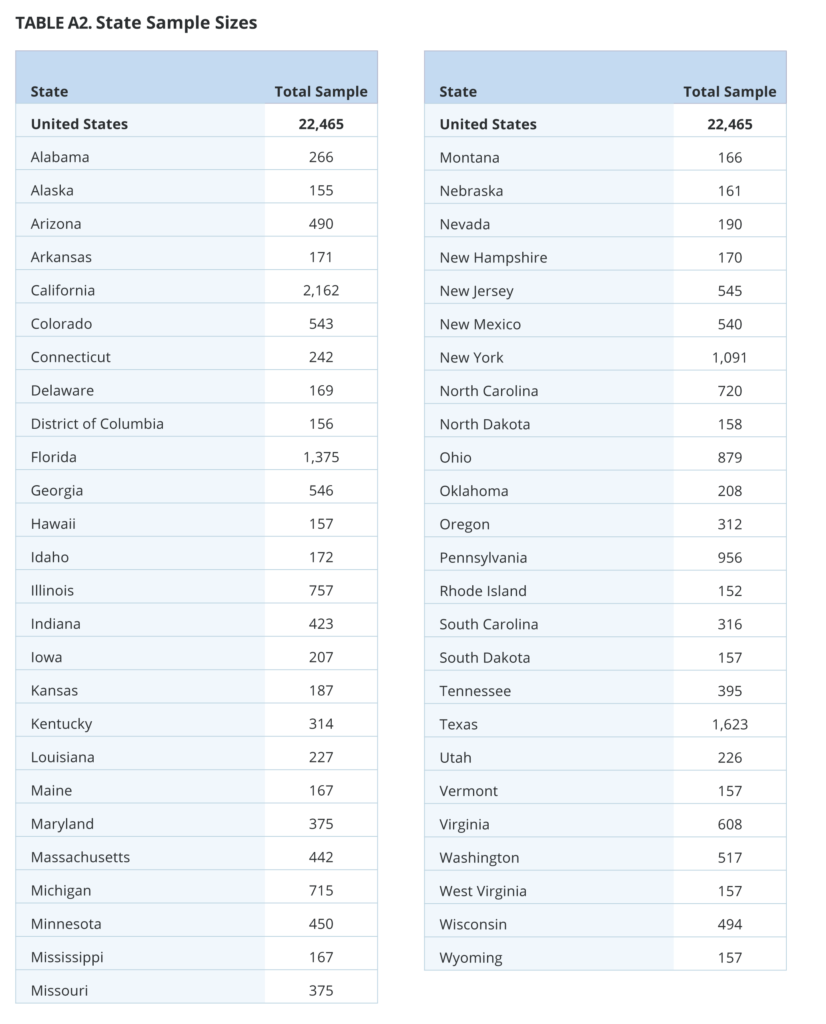
Appendix B: Resistance to Christian Nationalism by State, Coded by Projected Red, Blue, and Battleground States in the 2024 Election
The following table is sorted in descending order by the proportion of residents in each state who qualify as Christian nationalism Rejecters. Additionally, rows are coded red for safe Republican states, blue for safe Democratic states, and tan for battleground states. 